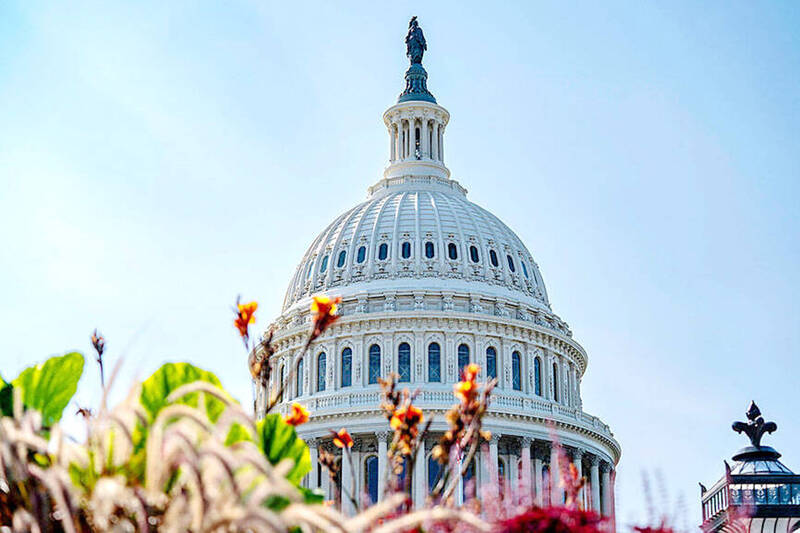A bipartisan group of US representatives has introduced a bill to codify the “six assurances” as official US policy.
The six assurances to Taiwan act, introduced on Thursday by US Representative Raja Krishnamoorthi and five cosponsors, would also require congressional approval for any attempts to alter the guarantees.
The “six assurances,” which were given by then-US president Ronald Reagan to Taiwan in 1982, include pledges not to set a date for ending arms sales to Taiwan, not to hold prior consultations with China regarding arms sales to Taiwan, and not to play a mediation role between Taiwan and China.

Photo: AFP
They also include assurances that the US would not revise the Taiwan Relations Act, not take a position on the issue of sovereignty over Taiwan and not pressure Taiwan to enter into negotiations with China.
Members of the US House of Representatives Select Committee on the Chinese Communist Party said in a statement that the “six assurances” have been reaffirmed by every US administration since Reagan.
The assurances are referenced in multiple laws and serve as a “cornerstone” of US policy toward Taiwan and a stabilizing force in the Indo-Pacific region, but have not been formally enshrined in US law, the statement said.
“Taiwan is a vibrant democracy and a critical partner to the United States, and it deserves clarity and certainty when it comes to our commitments,” Krishnamoorthi, the committee’s ranking member, was quoted as saying in the release.
“By codifying the six assurances, this bill sends a clear, bipartisan message: We will stand firm against coercion, support peace and stability in the Taiwan Strait, and ensure that US policy remains consistent, principled and rooted in law,” he said.
The bill was cosigned by US representatives Gregory Meek, Zach Nunn, Greg Stanton, Young Kim and Nicole Malliotakis.
If the bill advances through the House, it would also need to be passed by the Senate and then signed by the US president to become law.

The Grand Hotel Taipei on Saturday confirmed that its information system had been illegally accessed and expressed its deepest apologies for the concern it has caused its customers, adding that the issue is being investigated by the Ministry of Justice Investigation Bureau. The hotel said that on Tuesday last week, it had discovered an external illegal intrusion into its information system. An initial digital forensic investigation confirmed that parts of the system had been accessed, it said, adding that the possibility that some customer data were stolen and leaked could not be ruled out. The actual scope and content of the affected data

DO THEY BITE IT? Cats have better memories than people might think, but their motivation is based entirely around the chance of getting fed Cats can remember the identity of the people who fed them the day before, Taipei-based veterinarians said on Friday, debunking a popular myth that cats have a short memory. If a stray does not recognize the person who fed them the previous day, it is likely because they are not carrying food and the cat has no reason to recognize them, said Wu Chou Animal Hospital head Chen Chen-huan (陳震寰). “When cats come to a human bearing food, it is coming for the food, not the person,” he said. “The food is the key.” Since the cat’s attention is on the food, it

A New York-based NGO has launched a global initiative to rename the nation’s overseas missions, most of which operate under the name "Taipei," to "Taiwan Representative Office (TRO)," according to a news release. Ming Chiang (江明信), CEO of Hello Taiwan, announced the campaign at a news conference in Berlin on Monday, coinciding with the World Forum held from Monday through Wednesday, the institution stated in the release. Speaking at the event, Democratic Progressive Party Legislator Huang Jie (黃捷) said she believed this renaming campaign would enable the international community to see Taiwan

TOO DANGEROUS: The families agreed to suspend crewed recovery efforts that could put rescuers in danger from volcanic gases and unstable terrain The bodies of two Taiwanese tourists and a Japanese pilot have been located inside a volcanic crater, Japanese authorities said yesterday, nearly a month after a sightseeing helicopter crashed during a flight over southwestern Japan. Drone footage taken at the site showed three bodies near the wreckage of the aircraft inside a crater on Mount Aso in Kumamoto Prefecture, police and fire officials said. The helicopter went missing on Jan. 20 and was later found on a steep slope inside the Nakadake No. 1 Crater, about 50m below the rim. Authorities said that conditions at the site made survival highly unlikely, and ruled